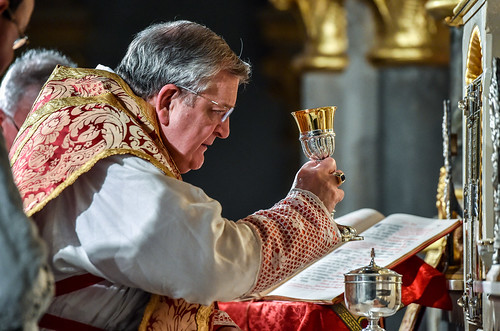 |
| Cardinal Burke celebrates Mass for the Latin Mass Society in London, Corpus Christi Maiden Lane, 2019 (photograph by John Aron) |
In the
Pillar, JD Flynn criticises
‘the siren voices calling for disobedience, or casting into doubt the authority
of the Vicar of Christ’. He has earlier quoted Cardinal Raymond Burke, Bishop Athanasius
Schneider, and Bishop Robertus Mutsaerts, but he leaves it to his readers to
connect what he quotes them as saying with ‘calls for disobedience’ and ‘casting
into doubt the authority of the Vicar of Christ’. This seems on the face of it
a serious injustice, and a failure to give these individuals the respect due to
their office and indeed to every Catholic, who has a right to his good name:
see Canon 220.
For readers
such as myself to be expected to examine the quoted remarks and look for
possible support of these serious allegations is ridiculous and an invitation to
uncharity. Flynn does not even give us a clue which of the three is implicated
in these two alleged offences. Indeed, it might even be that Flynn would, if
challenged, refer us instead to the unnamed others he vaguely refers to in the
course of the article. However, the insinuation remains, it is serious, and it
should be withdrawn.
To
illustrate, a reasonable person reading this article would conclude that ‘casting
into doubt the authority of the Vicar of Christ’ is a reference to the remarks
quoted from Cardinal Burke in the article:
“Can the Roman Pontiff juridically abrogate the UA?” Burke asked.
The cardinal concluded in the negative,
positing that the pope’s authority does not allow him “to eradicate a
liturgical discipline which has been alive in the Church since the time of Pope
Gregory the Great and even earlier.”
This is
then linked to an interpretation of His Excellency’s remarks by a CNA author.
Flynn does not express an opinion as the truth of this interpretation, and yet
feels justified to make his insinuation.
In point of
fact, Cardinal Burke’s remarks are not a denial of the authority of the Papacy,
but a comment about what that authority means. I would be interested to know if
Flynn would regard as a rejection of the authority of the Vicar of Christ these
words of the then sitting Prefect of the Congregation of the Faith, one Joseph
Ratzinger (The Spirit of the Liturgy (2000)):
After the Second Vatican Council, the impression arose that the pope really could do anything in liturgical matters, especially if he were acting on the mandate of an ecumenical council. … The pope’s authority is bound to the Tradition of faith, and that also applies to the liturgy. It is not “manufactured” by the authorities. Even the pope can only be a humble servant of its lawful development and abiding integrity and identity.... The authority of the pope is not unlimited; it is at the service of Sacred Tradition.
It is a
commonplace among theologians that the power of the Vicar of Christ is not
arbitrary or despotic, but given for a specific purpose, a purpose which
conditions the matters which it governs and also the way it can be used. The Church’s
own tradition of Canon law allows for the fact that some practices are simply
not uprooted by legislation against them and become legitimate with the passage
of time (Canon 24.2); that bishops can lift universal disciplinary obligations from
those under their charge for the good of souls (Canon 87.1), and that, in the
final analysis, the salvation of souls is the supreme law (Canon 1752).
The power
of the Vicar of Christ must be understood within this context, and not the
context of a modern, positivist conception of the law, which would make the
Pope into a dictator or even a slave-master. When Cardinal Burke directs our
attention to the correct context, he is doing a service to all who love and
respect the Office of the Papacy.